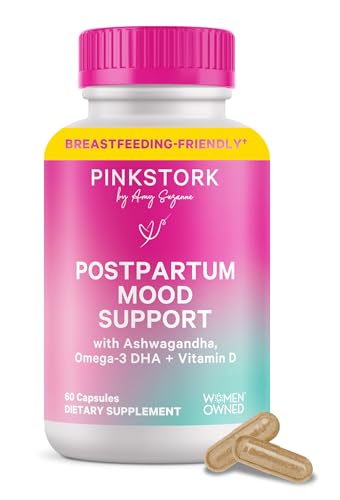Postpartum anxiety is a real and common experience for many new parents, often showing up as constant worry, racing thoughts, trouble sleeping, or feeling overwhelmed. Recognizing these signs early is key to getting help and feeling better. You shouldn’t ignore your feelings; reaching out to trusted loved ones or professionals can make a big difference. Keep going to find out more about how you can manage and overcome postpartum anxiety effectively.
Key Takeaways
- Postpartum anxiety is a genuine condition that affects many new parents, characterized by excessive worry, dread, and racing thoughts.
- Recognizing symptoms early, such as sleep trouble and constant dread, is vital for prompt treatment and relief.
- Building a support network of trusted family, friends, or support groups can help reduce feelings of isolation.
- Self-care practices like adequate sleep, hydration, mindfulness, and taking breaks are essential for managing anxiety.
- Seeking professional help through therapy or medical support demonstrates strength and is an effective way to find relief.

Have you ever felt overwhelmed or constantly worried after welcoming a new baby? If so, you’re not alone. Postpartum anxiety affects many new parents, and recognizing it is the first step toward feeling better. This condition can sneak up on you, making everyday tasks feel intimidating and leaving you with persistent feelings of dread or panic. It’s important to understand that postpartum anxiety isn’t a sign of weakness or failure; it’s a real medical condition that requires attention and care.
Feeling overwhelmed after a new baby is common; postpartum anxiety is a real condition needing care and support.
One effective way to combat postpartum anxiety is by adopting self care strategies that prioritize your mental and physical well-being. Simple practices like getting enough sleep, staying hydrated, and eating nutritious meals can make a big difference. Taking time for yourself, even if it’s just a few minutes each day, can help you regain a sense of control. Mindfulness exercises, deep breathing, or gentle stretching can also ease anxiety symptoms and promote calmness. Remember, caring for yourself isn’t selfish—it’s essential for your health and your ability to care for your baby.
Another essential aspect of managing postpartum anxiety is leaning on support networks. Don’t hesitate to reach out to trusted family members, friends, or other new parents who understand what you’re going through. Sharing your feelings openly can lessen the burden of anxiety and help you feel less isolated. Support groups, whether in person or online, can connect you with others who are experiencing similar challenges. Sometimes, just knowing you’re not alone can provide significant relief and encouragement. If your feelings of anxiety persist or become overwhelming, consider talking to a healthcare professional. They can offer guidance, therapy options, or medication if needed, ensuring you get the right support.
It’s also helpful to educate yourself about postpartum anxiety so you can recognize its signs early. Symptoms often include excessive worry, trouble sleeping, racing thoughts, and a constant feeling that something bad might happen. Learning about the importance of early intervention can help you seek help sooner and prevent the anxiety from intensifying. Remember, seeking help is a sign of strength, not weakness. Whether it’s talking to a therapist, joining a support group, or simply sharing your feelings with someone you trust, taking action is indispensable.
Ultimately, managing postpartum anxiety involves a combination of self care strategies and building a strong support network. Prioritize your mental health, reach out when needed, and be gentle with yourself during this challenging time. You’re doing an amazing job, and with the right help, you can find relief and enjoy this beautiful phase of life.

Pink Stork Postpartum Mood Support – Postnatal Hormone Balance for Women – Breastfeeding Friendly – Stress & Cognitive Support, New Mom Essentials – Ashwagandha, Chamomile, & Vitamin D, 60 Capsules
Pink Stork Postpartum Wellness Support is carefully formulated to support your body's natural postpartum rhythm and promote emotional…
As an affiliate, we earn on qualifying purchases.
As an affiliate, we earn on qualifying purchases.
Frequently Asked Questions
How Common Is Postpartum Anxiety Among New Mothers?
You might be surprised to learn that postpartum anxiety is quite common among new mothers, affecting about 10-20% of women. It’s a significant aspect of postpartum mood changes that can impact maternal health. Many women experience symptoms like excessive worry or racing thoughts, but recognizing these signs early allows you to seek help. Remember, you’re not alone, and addressing postpartum anxiety is essential for your well-being and your baby’s health.
Can Postpartum Anxiety Affect Fathers or Partners?
Yes, postpartum anxiety can affect fathers and partners too. Your partner’s mental health might face challenges during this time, making it essential to provide paternal postpartum support. Recognizing signs early helps you both manage anxiety effectively. By supporting each other and seeking help when needed, you strengthen your relationship and ensure a healthier environment for your new family member. Remember, postpartum mental health isn’t just a concern for mothers.
Are There Effective Natural Remedies for Postpartum Anxiety?
Imagine calming waves gently lapping at your feet—that’s what natural remedies can provide. You might find herbal supplements like chamomile or lavender helpful for easing anxiety. Mindfulness techniques, such as deep breathing or meditation, help center your mind. While these options can support your well-being, always consult a healthcare professional before trying new remedies to guarantee they’re safe and effective for your postpartum journey.
How Long Does Postpartum Anxiety Typically Last?
Postpartum anxiety duration varies for each person, but many experience symptoms for weeks or months after childbirth. Recovery depends on factors like support, coping strategies, and whether you seek help. While some women see improvement within a few months, others may need longer to recover fully. Remember, understanding your postpartum anxiety timeline helps you manage it better and seek the right support for postpartum anxiety recovery.
What Are the Risks of Untreated Postpartum Anxiety?
Did you know that untreated postpartum anxiety affects about 15% of new moms? If left unaddressed, hormonal shifts and sleep deprivation can worsen symptoms, increasing risks like postpartum depression or strained relationships. It can also impair your ability to care for your baby, leading to long-term emotional challenges. Prioritizing help guarantees you regain control, protect your mental health, and foster a healthier environment for both you and your little one.

Mindsight 'Original Breathing Buddha' Guided Visual Meditation | 3 Modes to Slow Your Breathing & Calm Your Mind | Stress & Anxiety Relief | Wellness Gift | Adults, Kids, Classrooms | USB Rechargeable
🧠 WHAT IT'S FOR: Daily guided breathing to help calm & focus your mind during the day or…
As an affiliate, we earn on qualifying purchases.
As an affiliate, we earn on qualifying purchases.
Conclusion
Remember, recognizing postpartum anxiety is like discovering a hidden storm inside you—powerful but manageable once you seek help. You’re not alone in this battle; millions of new moms face the same invisible struggle. By trusting yourself and reaching out, you can tame this tempest and find calm amidst the chaos. Don’t let anxiety control your life—your strength is greater than you realize, and brighter days are just around the corner.

BEREST Baby Sleep Soother Bear, Mom's Heartbeat & Lullabies White Noise Machine, Nursery Decor Night Light Projector, Toddler Crib Sleeping Aid, Newborns Shower Gifts Portable Teddy
1. Perfect Baby Shower Gift: BEREST baby sleep soother bear is a super soft sleepy plush toy with…
As an affiliate, we earn on qualifying purchases.
As an affiliate, we earn on qualifying purchases.

The Pregnancy and Postpartum Anxiety Workbook: Practical Skills to Help You Overcome Anxiety, Worry, Panic Attacks, Obsessions, and Compulsions
Used Book in Good Condition
As an affiliate, we earn on qualifying purchases.
As an affiliate, we earn on qualifying purchases.









